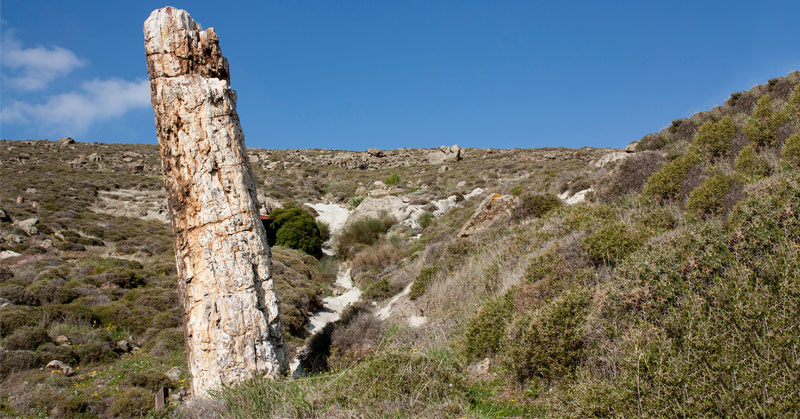
Lesvos island hosts a wealth of geological heritage sites including the famous Petrified Forest of Lesvos, areas of natural beauty, rich ecosystems and a variety of cultural monuments. All these elements contributed to the island’s recognition as a UNESCO Global Geopark, the third site designation of UNESCO.
Lesvos island UNESCO Global Geopark is member of the Global Geoparks Network and the European Geoparks Network.
The western peninsula of Lesvos island is dominated by the imposing Petrified Forest, which has been declared a Protected Natural Monument of Greece in 1985.
Lesvos is strewn with significant geological monuments and landforms, important witnesses to the Aegean basin’s geological history during the last 300 my, such as volcanoes, hot springs, important fossil sites, impressive tectonic structures and active faults, waterfalls and coastal geosites.
Lesvos’ s ecological value is evidenced by three regions which have been included in the European Natura 2000 Network: “Western Peninsula-Petrified Forest”, “Kalloni Gulf Wetlands” and the “Gulf of Gera and Mount Olympus”.
In Lesvos, one encounters prehistoric and historic archaeological monuments, medieval castles, Byzantine monasteries, and traditional villages. The rich architectural heritage is based on the use of local building materials which reflect the geological heritage and the natural environment.
Lesvos is the birthplace of many important luminaries in the arts and literature such as the poetess Sappho, the philosopher Theophrastus, the poet Alkaios, Pittacus the Philosopher, Terpandros the lyrist and the more recent G. Jakobides and the nobelist poet of the Aegean, Odysseas Elytis.
The Lesvos Geopark highlights the evidence of its geological natural and cultural heritage and sets the stage for visitors to familiarize themselves with a rich network of geological heritage sites and ecosystems, archaeological sites and monuments, as well as a variety of attractive museums and galleries.
Visitors can participate in various ecotouristic activities, unique, educational programs, marine and agrotouristic events, cultural festivals, as well as enjoy hiking, through a unique natural environment once walked by Aristotle and Theophrastus, cycling, sailing, surfing, guided boat trips, diving, climbing and a variety of activities to discover hidden natural treasures.








